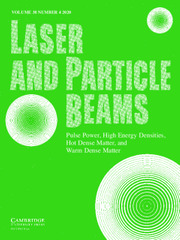Article contents
Improvements to ion-correlation experiments in dense plasmas
Published online by Cambridge University Press: 09 March 2009
Abstract
Improved measurements of ion-correlation effects in a dense shock-compressed plasma are presented. The extended X-ray-absorption fine-structure (EXAFS) technique on the aluminum K edge is used to observe the short-range order within a dense plasma. Densities of about three times solid density were measured with good accuracy. The experimental measurements of density give results that are in good agreement with the MEDUSA onedimensional fluid code predictions. The improved quality of the data enabled us to calculate the ion coupling parameter during the compression and the subsequent heating of the plasma. An estimation of the temperature is given on the basis of published models, and an approximate agreement is obtained with the MEDUSA code predictions.
Information
- Type
- Research Article
- Information
- Copyright
- Copyright © Cambridge University Press 1992
References
REFERENCES
- 6
- Cited by

